Anti-Inflammatory
A middle path for navigating health, political fallout, and receiving grace (and in which I don't tell you how to vote)
I have mixed feelings about doctor's appointments. On a weekend three years ago I was diagnosed with lupus. It was a foundational pivot-point in my life. Even if the illness as a much less significant role than the all-encompassing role it had then, this before/after forever changed me.
My experience with an inflamed and ill body makes me consider what mountains we die on, how we show up for other humans, and the way we navigate the inflamed middle ground in a polarized climate.
Holistic vs. medical
Recently I had a rheumatology appointment to discuss my current levels of pain and inflammation. It was far away to get to and it finished quickly. Sometimes I wonder if it is worth the effort. But experience has shown me what can happen when not on treatment.
I have other people in my life who have strong opinions of another side. They tell me to just eat certain foods, don't eat those other foods, drink those drinks, use those oils, intermittently fast...and your body will be perfect.
I had an appointment with one of these believers the day before and he was pushing hard what he claimed was “low-hanging fruit,” a seeming miracle solution. Surely science would have backed it up by now if it could change the trajectory of one’s chronic illness. But I agreed that indeed it was easy. So why not try it?
What I have trouble getting on board with are all the holistic things that have a high cost—in time, energy, effort, mental load, and money. I can’t pay the price, but if I work hard I might be able to figure some of it out. It makes sense why I would want an ROI before committing.
In the middle
I still believe that health might be found in a combination of both a medical and a holistic approach. Self-care, eight-hours of sleep, with whole, and some healthy anti-inflammatory foods, vitamins, sunlight, and exercise. But in addition, with medical treatments to fill the gaps where my body has been unable to self-heal.
Like most things in the United States, this is a polarizing opinion. To be in the middle is often condemned. Why is it that being centrist is almost the most appalling choice of all?
In fact, I am pretty sure that many of you reading this will feel frustrated with me and those in the middle like me. Read on, for you and I are the same just in different ways.
Lukewarm
In Christians circles being in the middle can be associated with being lukewarm. The Christians I’ve lived my life around have always been quick to quote a passage in Revelations about being spit out of God’s mouth—Be hot! Be cold! Just don’t be lukewarm!
God’s challenge reminds me of the inverse of Goldilocks and the Three Bears, but in a search for commitment instead of Goldilocks’ quest for comfort. In the scriptures this is a prophetic metaphor about following Jesus—not any secondary side shows we tend to judge others in. It is a passage about indifference and self-deceit, in many ways akin to the fable of the Emperor’s New Clothes.
“Lukewarm” isn’t a slur to be used against those in the middle. Not in regards to politics. Not in regards to health care. Not in regards to whatever that culture wants us to have an inflammatory opinion on.
Choosing a side
I'm not saying there's not a time for choosing a side. There is. And I often do.
If you read my other blog, AverageAdvocate.com, you're aware of how constantly and consistently I push against indifference and ignorance in order to respond to injustice and do what is good as I love my God. My whole career is centered around paving a realistic path for us out of our complacency.
And still, I don’t choose a side in everything. And when I do, they are typically not in very clear-cut lines. We can hold passion and persistence while walking a tightrope between extremes. These are not always at odds, as the pressures around us scream at us to choose a side.
Our stories and empathy
When I say I am in the middle; that I’m a centrist, I think I am expressing how I value others. For example, when I choose a side, I first dive deep into understanding alternate perspectives.
In my opinion the worst folly of all is forgoing empathy. It is an inflexibility which makes us think we are right. It is a refusal to hear another’s story or at least understand what drives them. In it, we lack the humility to consider we might not interpret truth perfectly. We cannot recognize our own infallibility. It is a choice to not extend grace for those trying to thrive or survive, even if misguided.
Burning brightly
But even in that I can understand why the majority of people live this way. For I used to be this way myself. I was a self-righteous religious queen! I was an angry activist burning with holy fire. At least, I was until God gently and graciously corrected and redirected me. Like an artist, he reshaped my rugged lines.
And yet, although the fire has morphed in its colors and melody, I still burn brightly.
In my body, while in a lupus flare, these aren’t comparable. But maybe this is a dialectic we can live in our response to the world and its systems: we can be on fire and anti-inflammatory.
Being bad at politics
Last week I filled out the ISideWith.com quiz, just as I have for the past presidential elections. This time it didn’t bring me the clarity I hoped for.
My desire to recognize the imago dei in my fellow humans influenced each question. I’d ask myself:
“Which policy values and gives dignity to my fellow humans the most?”
“What policy best gives people the chance to flourish as a group?”
“Which incumbent has good character and the required maturity to help their constituents flourish?”
I might like these questions, but it didn’t go well. For the questions that actually had a response, the answer was never in black and white policy. It is tricky when each human needs different things.
Then for many policies, these questions don’t even matter—people aren’t even in the equation. On these topics, I feel like I shouldn’t be asked to make a decision. It isn’t in my lane, I have no expertise, and I have no moral opinion on it. Why should my vote matter on these topics?
It’s possible the quiz didn’t help me because I too frequently chose the “other opinion” option. I’d fill in the blank with a policy that might solve problems, but no way would the primary parties ever agree on.
I’m just too “centrist” as the graphs define me.
Not my mountain to die on
Is it that I don’t care enough about politics? No, for I am far from indifferent. I care deeply about the system I live in. I appreciate the privilege. I care about voting, especially for my local government.
I can’t help but observe this election is simply a continuation of millennia of experiments on government and power grabs.
I realized I’ve changed since the last presidential election. Even though my opinions were more concrete then, I am grateful I have changed. I’ve had more experiences that have taught me that procuring the perfect government is not the mountain I want to die on. Politics are not my hope or salvation.
Politics just are.
I am within a system.
I don’t ignore government.
I leverage it.
This is my relationship with politics and it isn’t popular. I feel like I am standing in the middle of a no man zone in a war, calling out, “What is peace to you? Is there any hope for us to eat a meal together?”
And then both sides proceed to yell at me.
The quiet life
In this election season, my mind keeps wandering back to a verse that is ideal for No Hustle November. And it has strangely brought me comfort:
“Make it your goal to live a quiet life, minding your own business...” 1 Thes. 4:11 NLT
If I am honest, I used to hate this verse. What about Jesus knocking down tables, I’d ask? What about all the radical life that Paul lived? What a hypocrite!
And yet here I too am demanding a side: Are we radical, bold, loud, confident, advocates for what is right? Or are we complacent, indifferent, discouraged, ninny’s, and out of the game?
It is in my human nature to demand a side. Just as others have demanded I choose a side on things I am just not able to choose a side on.
Paul, and Jesus, and so many other characters in scripture and in history have lived both. There is a time for both of these. And this is what I mean about being in the middle and being anti-inflammatory.
You don’t have to be politically centrist or moderate like I am—that isn’t what I am asking you to do. But I am asking you to be both a fire and live a quiet life.
In the middle of grace
Then I finally broke down. I was sobbing because I the sicknessness I’ve been surrounded by in my family make me feel so out of control. I broke down as I am afraid, afraid to make plans, afraid to move forward, afraid to commit to the wrong choice. I’m afraid of ending up in the ICU with pneumonia. I’m in survival mode; I’m paralyzed by indecision.
Sobbing ridiculously, I decided to add to my prayer, “I still can’t even make a decision about what is best regarding this proposition! And I don’t want any of these candidates for president!” It hasn’t helped that this whole election has triggered flashbacks of times I’ve been accused of not making the right choice—and opting not to make a choice. The loss following my choice to not choose a side was severe and traumatic.
Desperately seeking for anything to ground me, I pulled a book down from the shelf next to me. This is the passage a flipped to, as I cried out to God from the middle ground:
“While you may feel…strong, you still experience a forceful undercurrent of anguish. You have to keep moving, as you are doing. Live a faithful, disciplined life, a life in which you can receive more and more of the love that comes to you…One day you will discover that your anguish is gone. It will leave you because your weakest self let itself be embraced…Hold on to your chosen direction, your discipline, your prayer, your work, your guides, and trust that one day love will have conquered enough of you that even the most fearful part will allow love to cast out all fear.” - Henri J.M. Nouwen
And I remembered that here, unsure about what to write on my ballot, afraid of people hating me because I am too centrist, afraid of my body getting inflamed again—I am held by grace. I am loved. I am loved by God and nothing, not an election, not people who have more extreme opinions, and not even sickness can keep from this love.
Dear brave ones
As I pacify the disease of lupus, I want to be anti-inflammatory, not inflammatory. I feel the same way about how I live as a citizen of my country. Yet, by choosing this path of the middle road, of empathy, of less clear lines—at times I am seen as the most inflammatory of all.
To all who walk the line with me I see you. I see you who are soft and bold, quiet and loud, on fire and are peacemakers, who sometimes compromise and at other times are flipping tables.
I see your courage. I want you to know that there is more grace here in the middle than you’ve yet known.
This month is No Hustle November! You are invited to join me leaning into trading stress for a spirit of rest. No Hustle November isn’t quantifiable; rather it is an intention. Later this week I will be sharing more about this, but wanted to let you start considering it. (Learn more here)

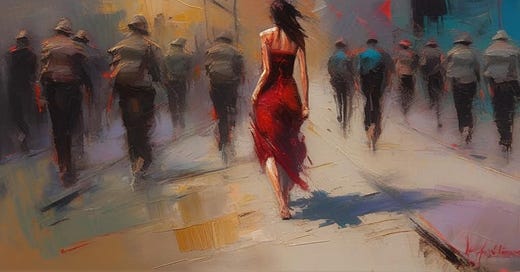




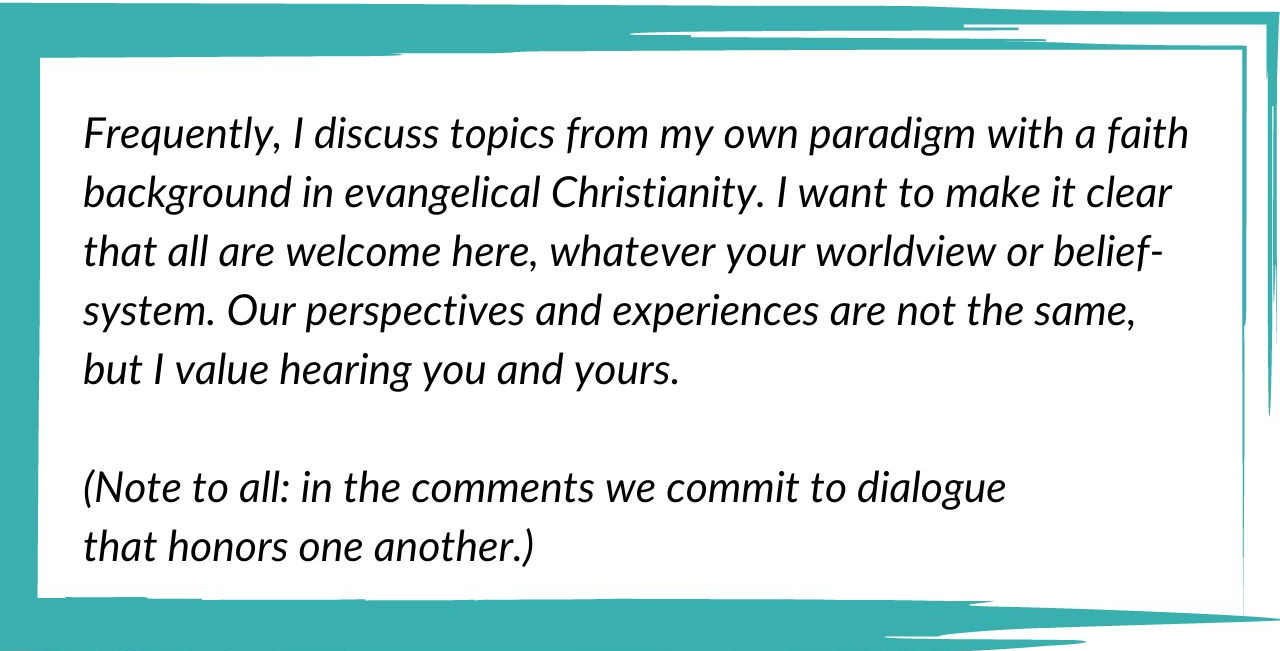
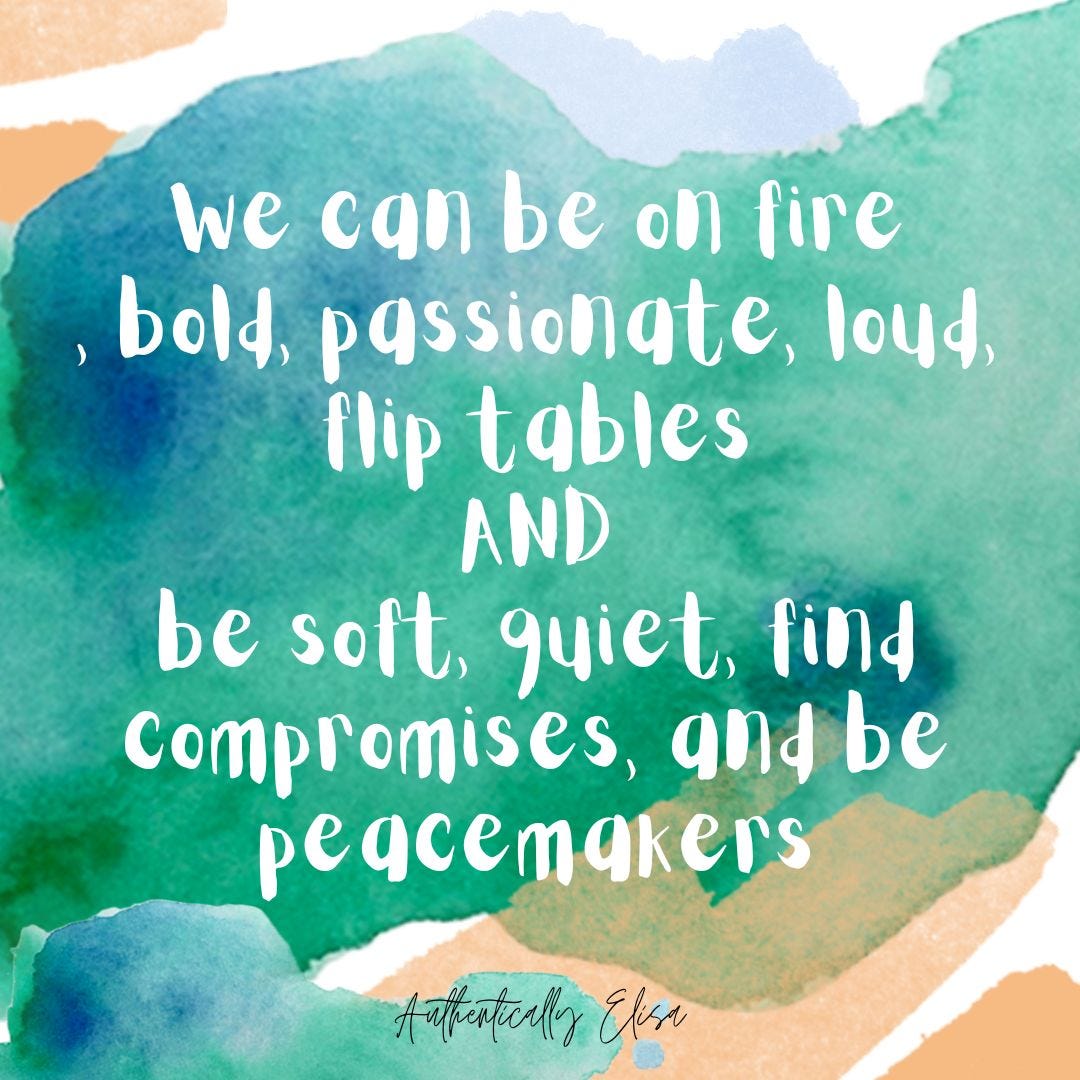
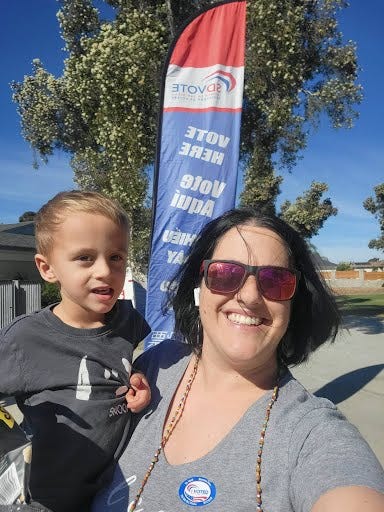
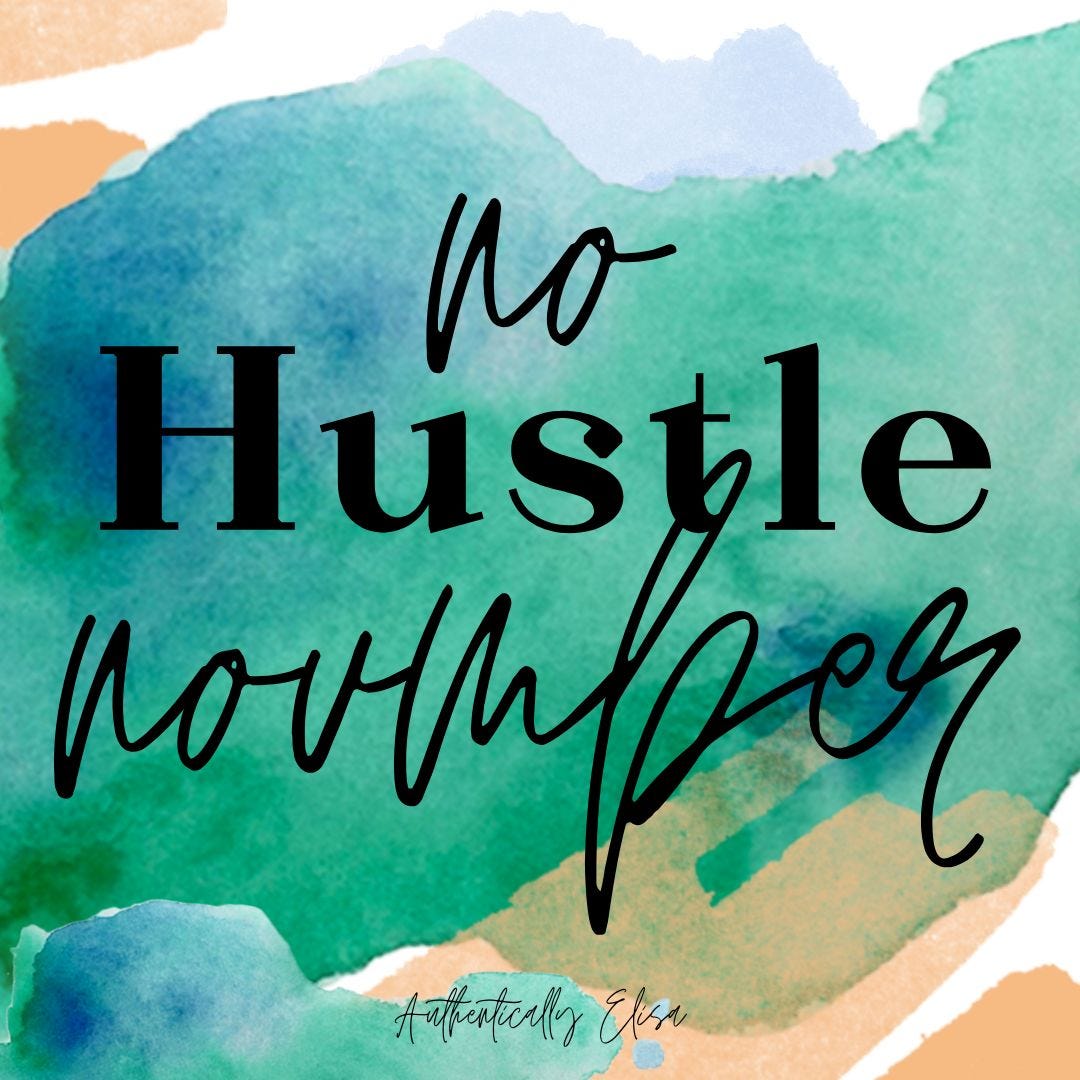
I very much appreciated this post. You write extremely well, both in technical sense and, as if not more importantly, in conveying the crux of what you wish to communicate.
I was surprised, at first, at my response because I have no religion and consider it to be one of the most negative influences on humanity, (My reasons are not appropriate here or, at least, would take too long to explain or argue.). I am not, either, attracted to noble or (supposedly) significant selected extracts from the writing or word of others.
However, what appeals to me, I think, is your honesty and openness. Human beings are social animals and so necessarily seek to be part of groups. Unfortunately, once groups are formed, they are all too readily controlled by individuals who have more interest in self promotion than tht of the group. Inevitably, that leads to difference and often antagonsim amongst groups, particular where scarce resources are needed by all.
Attempting to reconcile the, effectively, legitimate needs of different groups or even individuals and to acknowledge them with disinterest, i.e. objectivity, one is likely to meet the ire of both, but particularly that of the group to which you ostensibly belong. It is for that reason that finding the strength to honour and transmit your own truth is so important not just to living an honest life but to life itself.
Sitting in the middle in the sense of appeasement of both or multiple sides of different viewpoints will inevitably be met with negative criticism and that may well be justified for 'appeasement' of the unjust is not useful and may be extremely dangerous. However, attempting to analyse and understand the varied views and go beyond the surface, (the symptoms), to the cause of those views, i.e. the experiences and conditioning that have influenced their creation, is a positive and worthwhile, indeed beneficial approach for it is more likely to bring people together than separate them.
Mediators seek to do exactly this. However, rather than state the obvious, (to them), flaws or differences in points of view, they use their skills of objectivity to promote real expression of those in different spaces and so, to show them, even more importantly what similarities exist between them. This is a process of healing. - No, it doesn't offer a simple solution; it is not a case of 'one size fits all'; it is not imposed from the 'expert' outside; rather it is a subtle encouragement of the participants to listen to one another, rather than only themselves.
Operating from the 'middle', so to speak, acknowledges and respects all views, regardless of their considered worth or rationality. As such, it avoids adversarial increase, instead promoting insight and respect for all concerned. In other words, it takes over - or at least mitigates to an extent - the insistence of ownership of the 'norms', traits and more's of the group.
Humanity will only survive in any reasonable form if people such as yourself, who can see that there are no 'fixed lines', 'right or wrong', 'good or evil' and etc. but rather just rather simple beings who nevertheless have mastered complex concepts yet even now, according to science, use less than 10% of their brain's intellectual capacity. In my view - and, no, I can't point to other than anecdotal evidence of it, this is made worse because most of that sub 10% is directed to pragmatic, technological survival aids and needs and very little to those of those of the affective domain - sharing, caring, accepting, understanding, assisting, welcoming, collaborating and etc.
So, for me, your story it very much allegorical of the situation within and across the human race and, if more human beings would realise what you have, and give away prescribed 'codes' that are supplied by religions, clubs, governments, laws, cultures and such, then perhaps humanity would be overall more peaceful, productive and worthy of life and all its wonders on such a beautiful and life-giving planet. Perhaps, also, many more would see the need to save it and take action to ensure that happens.
Thank you for a valuable post.
Take care. Stay safe. ☮️
p.s. I love the subtle ambiguity of the title, too.